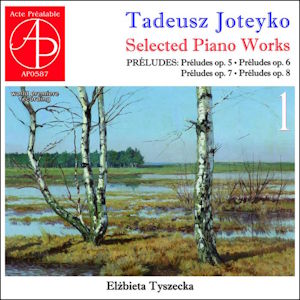
Tadeusz Joteyko (1872-1932)
6 Préludes Op.5 (publ.1913)
6 Préludes Op.6 (publ.1913)
6 Préludes Op.7 (publ.1913)
6 Préludes Op.8 (publ.1913)
Elżbieta Tyszecka (piano)
rec. 2024, Studio im Witolda Lutosławskiego w Warszawie
Reviewed from download
Acte Préalable AP0587 [48]
Another unfamiliar name from Poland’s rich artistic past, Tadeusz Joteyko was born near Kyiv though the family moved to Warsaw in 1873 for the educational advantages offered to Tadeusz and his three siblings. He studied for couple of years in Brussels though his primary studies appear to have been with noted composer Zygmunt Noskowski (1846-1909). He went on to teach at the Warsaw Conservatory and was the musical director of music societies in Łódź and Kalisz. He worked tirelessly for musical education in Poland and was vice-president of the Association of Polish Composers. His own works include five operas and some orchestral music as well as chamber works, songs and piano works. This recording is listed as selected piano music volume 1 so we may explore more of his many morceaux and dances.
The disc is devoted to the 24 préludes in all major and minor keys which, like the préludes of Abram Chasins, are divided into four books of six with a different opus number for each. They are mostly attractive pieces without being remarkable, very late romantic in feel and even when Joteyko tries some more adventurous harmonic palette it only adds a little piquancy to the mood of the piece. I think my favourite here is the first prélude of op.5, chordal and unassumingly sentimental; Joteyko brings us full circle by bringing it back as a contrasting section to the elegiac final prélude, op.8 no.6 moving it into E major. Other highlights are op.6 no.1 with its chordal dialogue between the piano’s lower and upper reaches and the sad prélude with its slowly descending chromatic melody op.6 no.4. Op.7 no.2 is another sad number with a left hand melody singing under repeated right hand chords while the opener of this set is a lilting song without words with a rolling left hand arpeggio accompaniment. The ponderous chords of op.7 no.4 have some nice harmonic progressions as does the little minuet of op.8 no.1 while the second of op.8 is a delicately impish little waltz with some juicy little clashes. Others are pleasant without any real distinction and a couple are uninspired; op.6 no.3 with its arpeggios in both hands bears a visual similarity to Chopin’s étude op.25 no.1 and shares its key of A flat major but the comparison ends there as Joteyko’s melodic and harmonic interest is poor. Occasionally, at least to my ears, there are some just plain clunky chord changes that don’t seem to follow the natural progression – I’m all for surprising turns of harmony but this doesn’t inspire an ooooh tingle, more of a what?
This is never going to challenge the supremacy of Chopin’s or Scriabin’s préludes but they are engaging enough. I think I would find more to engage me if Tyszecka could fire those passions but I found too often that the playing was too careful by far. Op.8 no.3 is a tarantelle in all but name and is marked allegro vivace; it could be quite exciting to listen too was it not for the stately pace that she sets. The contrasting barcarolle at its heart making for a duo of Italian dances is more successful. Allegro appassionato is the heading for op.7 no.6 but it is taken at a leisurely andante that is barely faster than the central section in the major key marked lento – slow. Its emphasises the similarities to the big chords of Rachmaninov’s famous prélude in the same key, C sharp minor, but that is marked lento after all. The fifth of the op.7 set has the potential to be a sparkling scherzo but again its restrained tempo fails to ignite the piece and the tripping staccato notes fail to dance.
Congratulations to Acte Préalable for the discovery and there is much to enjoy but more exuberant pianism is needed to show these works at their best.
Rob Challinor
Availability: clicmusique.com

















